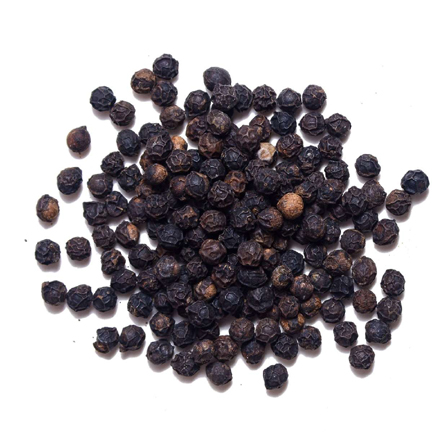
BY AFSHAN NABI (MBG/III)
afshan.nabi@ug.bilkent.edu.tr
In 410 AD, the Visigoths, a nomadic Germanic tribe, attacked and captured Rome, the “Eternal City” of the Western Roman Empire. As ransom, they demanded (approximately) 1,360 kg of this:
Yes, that is black pepper.
This little anecdote illustrates beautifully how highly black pepper was valued in ancient times.
Here are some other tales of the (hottest) spices that changed the course of the world and humanity.
A long time ago, in a galaxy far, far away…
No, wait!
About 4,000 years ago on our very own little planet Earth, the spice trade began in the Middle East. Arab merchants drove a hard bargain by telling their customers fantastic tales of how they came by the wares they sold: for example, fighting off savage winged creatures (dragons?) to reach spices growing high on cliff walls. The spice trade is thus believed to have inspired legends like that of Sindbad the Sailor. The Arabs kept the source of the spices, Asia, a close secret; this allowed them to grow immensely rich. The trade was conducted overland via camel caravans along the Silk Route, which connected Asia to the Middle East and Europe.
 Examination of the mummy of Ramses II, the pharaoh who ruled Egypt from 1279-1212 BC, led to a dazzling discovery: tucked inside his nostrils was – you guessed it – pepper. Pepper is indigenous to Kerala, located on the southwestern coast of India; those particular peppercorns had evidently traveled all the way from Kerala to the hands of the Egyptian embalmers. And if the dead pharaoh had it tucked into his nostrils, pepper was definitely prized highly by the Egyptians.
Examination of the mummy of Ramses II, the pharaoh who ruled Egypt from 1279-1212 BC, led to a dazzling discovery: tucked inside his nostrils was – you guessed it – pepper. Pepper is indigenous to Kerala, located on the southwestern coast of India; those particular peppercorns had evidently traveled all the way from Kerala to the hands of the Egyptian embalmers. And if the dead pharaoh had it tucked into his nostrils, pepper was definitely prized highly by the Egyptians.
The Greeks and Romans too traded in spices. Pepper was valued both as a preservative and as an aphrodisiac; the former use is now discredited while the latter has been validated. The wealthiest and most powerful individuals of the time wore a perfume scented with pepper. (I don’t suppose it would have made them sneeze!) In the first century, the Roman Empire was a major player in the control of the spices entering the Mediterranean region. Roman soldiers were, in fact, frequently paid in salt. The word “salary” is derived from the Latin word “sal,” which means salt.
Over the centuries, many battles were fought to control the spice trade. In the mid-13th century, Italian city-states, especially Venice, monopolized the trade into Western and Northern Europe. The Italian traders also set steep prices, which allowed Venice to grow in prosperity. The rest of Europe could do nothing but pay the price, since they lacked direct access to the Middle Eastern sources. It is said that when the prices were at their highest, a pound (approximately 453 grams) of nutmeg cost seven fattened oxen in Europe! It was more valuable than gold, and even the aristocracy found it difficult to afford this and other spices, like pepper and cloves.
Some historians argue that the turning point leading to the birth of the world as we know it came in the 15th century when angry aristocrats decided to break the Venetian monopoly. Wealthy entrepreneurs began to recruit explorers in order to reach the source of the spices, bypassing the Venetian merchants and their exorbitant prices: thus began the European Age of Discovery. Navigational equipment had improved, as had the capacity to sail long distances. Explorers set out from Portugal, Spain, the Netherlands and England. Many missed their mark and found new lands and treasures; Christopher Columbus set out in search of India and found America instead. He brought chilies back to Spain and called them peppers, after the peppercorns he had set out to find.
A ship sailing under the Portuguese captain Vasco da Gama was the first to circumnavigate the Cape of Good Hope (the southwestern tip of the African continent). He eventually reached Calicut in India, laying the foundation for the Portuguese Empire. For a while, in the 16th century, Portugal held a monopoly over the spice trade. During this period, half of the revenues of the Portuguese government came from Asian spices and African gold, the spices being more valuable than the gold, of course.
However, Spanish, English and Dutch expeditions were not far behind. The competition sparked bitter conflicts over control of the spice trade. The burgeoning European empires used dubious and often brutal tactics to establish footholds in India and Southeast Asia. During the 16th and 17th centuries, wars broke out among the European nations over control of the Indonesian “Spice Islands.” Spain and Portugal fought over pepper, while the English and Dutch quarreled over nutmeg. In the 1667 Treaty of Breda, the Dutch, in order to maintain their monopoly on nutmeg, traded off New Amsterdam (Manhattan) to the British for a tiny nutmeg-producing island called Run. At the time, the British were not too pleased with the deal and tried to exchange Manhattan for sugar-producing regions in South America.
And thus, European colonizing of any territory suitable for growing crops began. To bring the wealth back to the home countries, ships sailed back and forth across the oceans, and globalization of the world also began.
As the trade routes were wide open, over time people began to transplant spice-bearing plants to other parts of the world. Spices became more common and their prices fell; now they are no longer a luxury equivalent to, or even more valuable than jewels and gold. (Case in point: black pepper is free for the taking at Marmara.) But the incredible flavors, hues and aromas, and the various medicinal properties that all made spices so valuable in the past remain for us to enjoy today.
Such a fantastic tale, is it not?
The spices lying quietly in the darkness of our kitchen cabinets played a role in the growth of ancient civilizations with access to the Silk Route; drove the Europeans across oceans to establish enormously wealthy empires and fight bloody, bitter wars; led to the discovery of the Americas; and gave birth to the modern age.
My favorite is black pepper, though.
All hail, pepper!
